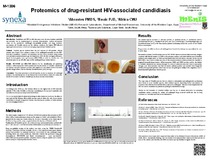Proteomics of drug-resistant HIV-associated candidiasis

View/
Date
2015Author
Abrantes, Pedro Miguel dos Santos
Bouic, Patrick J.D.
Africa, Charlene W.J.
Metadata
Show full item recordAbstract
Candidiasis and HIV co-infection may cause increased patient morbidity and mortality due to oropharyngeal or systemic dissemination. Limited information exists on the prevalence, antifungal susceptibility profiles and drug resistance mechanisms of Candida species on the African continent, the highest HIV-affected region globally and home to new and emerging drug resistant Candida species.
Candida species isolated from the oral mucosa of HIV-positive African patients were found to be resistant to many of the antifungals routinely used in HIV-associated candidiasis. Candida cell membrane fractions were examined using sodium dodecyl sulphate polyacrylamide gel electrophoresis (SDS-PAGE) and high performance liquid chromatography mass spectrometry (HPLC/MS) in order to elucidate the cell membrane proteins specifically expressed by antifungal drug resistant isolates.
SDS-PAGE and HPLC/MS allowed for the identification of multi-drug resistance efflux transporter CDR2 proteins and the elucidation of Candida colonization mechanisms and pH-responsive proteins, with significant associations observed between specific drug resistance and the duration of antiretroviral (ARV) therapy.
This study provided useful information on the mechanisms of antifungal resistance in Candida species. It also formed the basis for further studies to address the transfer of resistance between Candida species in an oral microbial biofilm.
